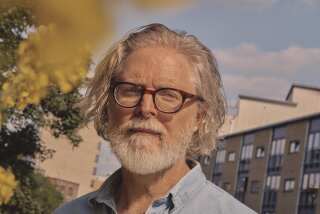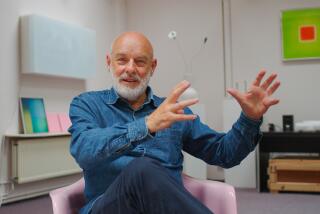‘I Love the Imperfect’
- Share via
I never thought that a popular work of Hollywood fiction, the kind beamed into my home with monotonous frequency on cable TV, would ever be cause for serious philosophical thought. I must admit, however, that I now appreciate the prophetic warning sounded in Andrew Nicholl’s science fiction drama, “Gattaca,” as a result of my experience with the medical establishment during my wife’s first pregnancy. Upon hearing the recent announcement that scientists have successfully mapped the human genetic code, I fear that prophecy is becoming a reality.
“Gattaca” opens dramatically: A disapproving doctor informs an expectant couple of their unborn son’s 99% chance of developing a heart problem because conception occurred through sex as opposed to genetic engineering. The protagonist, Vincent Jerome, is born into a seemingly futuristic world where doctors, as part of their routine, create genetically perfect humans. By contrast, the genetically imperfect are second-class citizens denied the opportunities and benefits of their engineered counterparts. After watching “Gattaca,” I promptly forgot about it--until my wife’s first ultrasound.
When my wife and I learned that we were expecting, our sublime joy was only slightly tempered by concern that my wife’s age (over 35) increased the possibility of having a child with a genetic abnormality. Oddly, this worry was of much greater concern to my wife’s doctors.
At our first appointment, the obstetrician informed us that all patients over 35 years of age undergo a diagnostic procedure known as amniocentesis, a process by which a syringe is inserted into the uterus to extract amniotic fluid. The test reveals a number of genetic deformities.
After discovering that the amnio presented a small risk of injury or death to the fetus, we decided to forgo the test because we planned on having the baby even if he suffered a genetic abnormality. Our position was not shaped by our views on abortion. We simply believed that we could love and care for our child irrespective of health problems.
The doctor’s reaction surprised us. After we informed her of our decision, the doctor coldly retorted: “This is America. We can’t make you have the test.” She bid us a facetious farewell declaring, “Go with God,” apparently convinced that my wife and I were born-again Christians or pro-life activists. (We are neither.)
Surprisingly, another doctor, whom we visited to obtain an ultrasound--a safer and less invasive, although less revealing test--reacted in like fashion. He passionately attempted to change our minds about the amnio. He suggested that if we were to forgo the test, we should first visit an institution that cares for the disabled to see how difficult it is to raise handicapped children. He also recounted the story of a patient who decided to raise a Down’s syndrome child but later told him that she regretted that decision. The doctor seemed genuinely perplexed as to why we would even risk having a child with an abnormality.
It was at this moment that I realized that we could soon be living Gattaca. Our doctors were merely doing what they saw as their job. They viewed genetic deformities as medical problems that, through technology, could now be cured by eradicating the potentially imperfect life before birth.
Of course, this philosophy may apply to more common illnesses or imperfections. My father has fought high blood pressure for years. I was born with bad eyesight and a predisposition for a less-than-svelte physique. My sister has asthma and is dyslexic. In a few short years, genetic engineering may erase such so-called “undesirable” characteristics.
All of this makes me sad. I think of the people I love and admire, my heroes and role models: Winston Churchill, Albert Einstein, my sister, my dad. Upon reflection, all of them are imperfect. They all possess attributes that they, or others, might want to change. They all could have been “improved” through genetic engineering. And yet, they have all made unique contributions to humanity.
With all of my imperfections, I am the father whom my son will love and admire. As I look at my son, seemingly very healthy, I wonder if I would love him less were he to become physically or mentally incapacitated or if his IQ hovered around 60. Frankly, I can’t imagine it. I love the imperfect.






